Many myths and legends grew out of the epic sweep of America’s “Wild West” past. Some figures, heroes as well as villains, are grounded in fact – including photographic evidence – while others remain less distinct. One of the latter is a man that we know very little about, although in his brief career as an outlaw he became infamous as the “Robin Hood of El Dorado.”
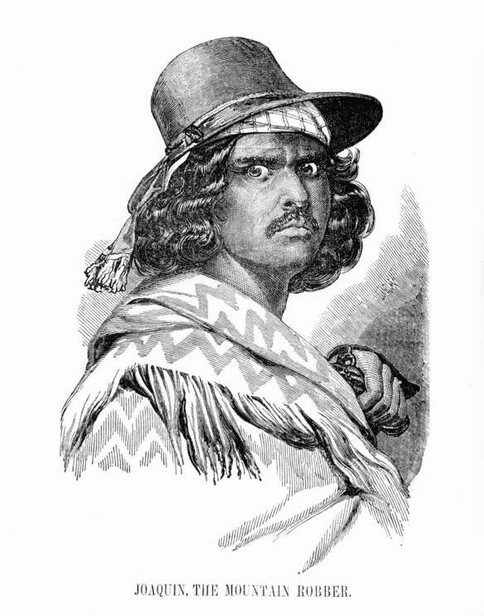
That man, Joaquin Murietta (or Murrieta) was killed on 25 July 1853 by a band of California State Rangers created especially for his capture. The head of the notorious bandit, pickled in a jar of alcohol, was shown in exhibitions throughout California for a very steep entrance fee of $1.
Who was Murietta? History is really not sure. We think he was born in Mexico, but maybe it was Chile. We think he was born in 1829, which means he was only 24 when he was killed. But in truth, we’re not even sure he was killed that fateful day in 1853, because some people claimed the pickled head was not the bandit’s at all.
It seems the young man and his family came to California as part of the Gold Rush of 1849, just a year after the U.S. wrested California away from Mexico by winning the Mexican-American War. We know that Anglo-Americans treated Mexicans (or, for that matter, Chileans) badly in the California gold fields, kicking them off their claims the same way the U.S. kicked out Mexico. Exactly what happened to Murietta is hard to say, as the stories we have come from a dime novel called The Life and Adventures of Joaquin Murrieta, written by John Rollin Ridge in 1854.
According to Ridge’s account, Murietta’s wife was raped, his brother hanged, and he was whipped and driven from his mining claim. He swore vengeance against the ruthless Anglo-Americans and became an outlaw, robbing from the evil miners and sharing the loot with impoverished Mexicans in the region. Others say that is nonsense; Murietta was simply a bandit and horse thief who murdered many innocent men and plundered only to enrich himself and his gang.
Whatever the truth, California Governor John Bigler signed legislation on 11 May 1853 creating a special force called the “California State Rangers,” led by former Texas Ranger Captain Harry Love, to capture Murietta and earn a $1,000 reward. This was the group that confronted a band of Mexicans in San Benito County on 25 July 1853, killing two. As evidence of their triumph (and to back up their claim for the reward), the Rangers cut off Murietta’s head and the hand of his accomplice “Three-fingered Jack,” pickling the body parts in jars of alcohol. They then collected their reward, disbanded, and the stories of Murietta’s true identify and fate became part of the legendary Wild West.
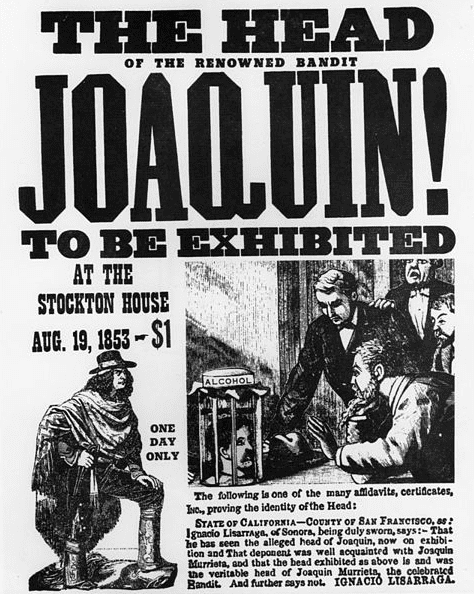
The following newspaper articles show how the news of Murietta’s death was reported at the time, with the last article providing details of his final encounter.
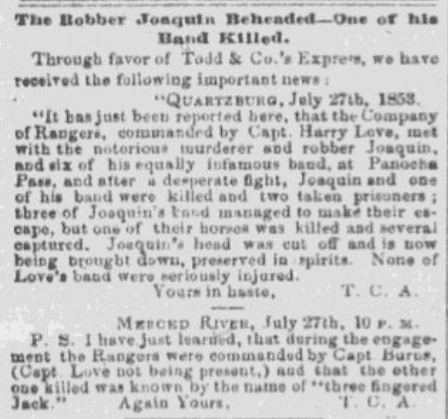
Here is a transcription of this article:
The Robber Joaquin Beheaded – One of His Band Killed.
Through favor of Todd & Co.’s Express, we have received the following important news:
QUARTZBURG, July 27th, 1853.
It has just been reported here, that the Company of Rangers, commanded by Capt. Harry Love, met with the notorious murderer and robber Joaquin, and six of his equally infamous band, at Panocha Pass, and after a desperate fight, Joaquin and one of his band were killed and two taken prisoners; three of Joaquin’s band managed to make their escape, but one of their horses was killed and several captured. Joaquin’s head was cut off and is now being brought down, preserved in spirits. None of Love’s band were seriously injured.
Yours in haste,
T. C. A.
MERCED RIVER, July 27th, 10 P.M.
P.S. I have just learned, that during the engagement the Rangers were commanded by Capt. Burns (Capt. Love not being present), and that the other one killed was known by the name of “Three-fingered Jack.”
Again yours,
T. C. A.
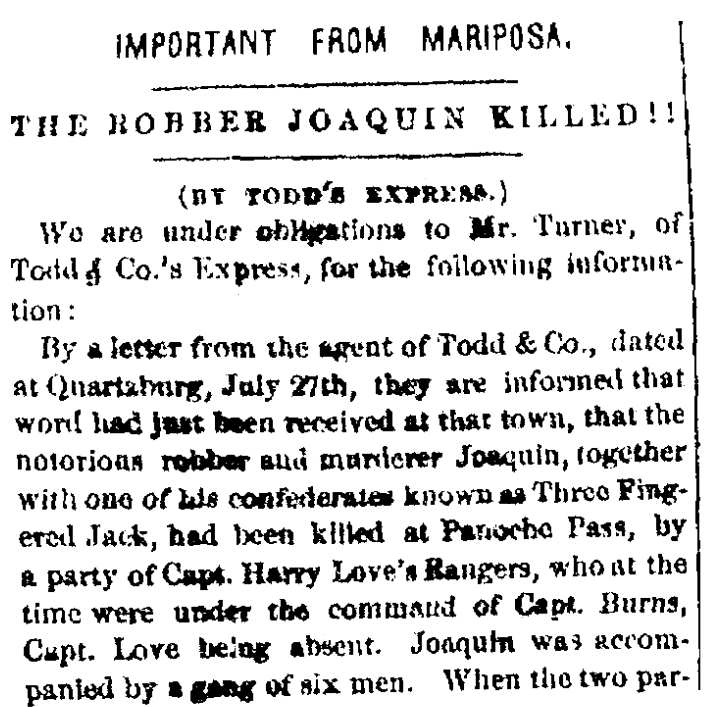
Here is a transcription of this article:
IMPORTANT FROM MARIPOSA.
THE ROBBER JOAQUIN KILLED!!
(By Todd’s Express.)
We are under obligations to Mr. Turner, of Todd & Co.’s Express, for the following information:
By a letter from the agent of Todd & Co., dated at Quartsburg, July 27th, they are informed that word had just been received at that town, that the notorious robber and murderer Joaquin, together with one of his confederates known as Three Fingered Jack, had been killed at Panoche Pass, by a party of Capt. Harry Love’s Rangers, who at the time were under the command of Capt. Burns, Capt. Love being absent. Joaquin was accompanied by a gang of six men. When the two parties came together, a severe fight ensued. Joaquin and Three Fingered Jack, with one of their horses, were shot. Two of Joaquin’s gang were captured, and were to be taken to Mariposa; the remaining three made their escape. Joaquin’s head was cut off, and put in spirits, to be preserved as a trophy. None of Capt. Burns’ party were seriously injured. The greatest excitement prevails at Mariposa and Quartzburg, no doubts being entertained there that it is the real Joaquin, who has at last met with a well deserved fate.
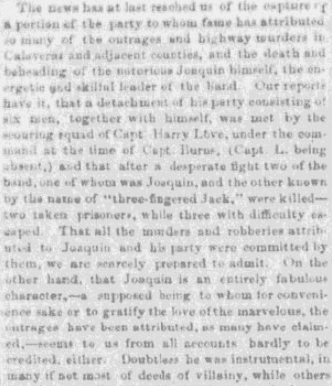
Here is a transcription of this article:
The news has at last reached us of the capture of a portion of the party to whom fame has attributed so many of the outrages and highway murders in Calaveras and adjacent counties, and the death and beheading of the notorious Joaquin himself, the energetic and skillful leader of the band. Our reports have it, that a detachment of his party consisting of six men, together with himself, was met by the scouring squad of Capt. Harry Love, under the command at the time of Capt. Burns (Capt. L. being absent), and that after a desperate fight two of the band, one of whom was Joaquin, and the other known by the name of “three-fingered Jack,” were killed – two taken prisoners, while three with difficulty escaped. That all the murders and robberies attributed to Joaquin and his party were committed by them, we are scarcely prepared to admit. On the other hand, that Joaquin is an entirely fabulous character – a supposed being to whom for convenience sake or to gratify the love of the marvelous, the outrages have been attributed, as many have claimed – seems to us from all accounts hardly to be credited either. Doubtless he was instrumental in many if not most of [the] deeds of villainy, while others have been attributed to him for the want of a better. That such a scoundrel and assassin named Joaquin is in existence, can be vouched for by competent witnesses, who have seen him, and who knew him as a monte [a gambling card game] dealer at Stockton. The intelligence of his death comes to us in so hurried a manner, that it may have arisen and taken shape from an unfounded rumor. One thing would go to show a plausibility in the news, that the person killed, supposed to be Joaquin, was beheaded after death, and the head preserved in spirits for identification, to satisfy those who knew him and the public generally, that it is the villain himself who is dead. We shall probably hear by the Stockton boats of this morning, either a confirmation or denial of the report received yesterday.
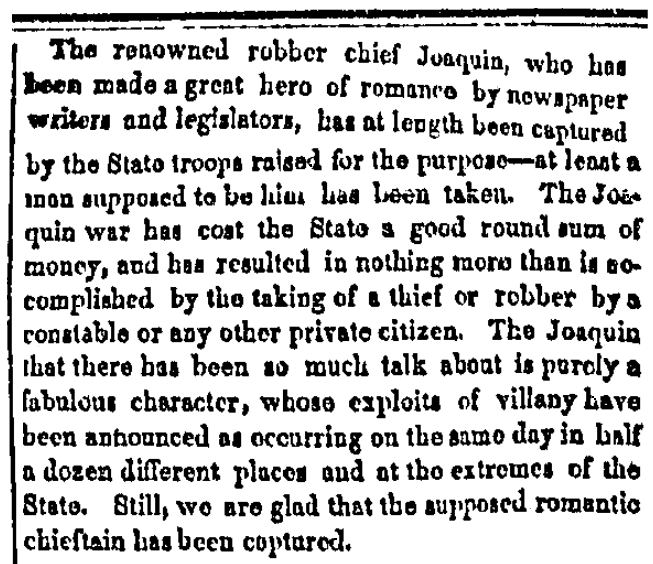
Here is a transcription of this article:
The renowned robber chief Joaquin, who has been made a great hero of romance by newspaper writers and legislators, has at length been captured by the State troops raised for the purpose – at least a man supposed to be him has been taken. The Joaquin war has cost the State a good round sum of money, and has resulted in nothing more than is accomplished by the taking of a thief or robber by a constable or any other private citizen. The Joaquin that there has been so much talk about is purely a fabulous character, whose exploits of villainy have been announced as occurring on the same day in half a dozen different places and at the extremes of the State. Still, we are glad that the supposed romantic chieftain has been captured.
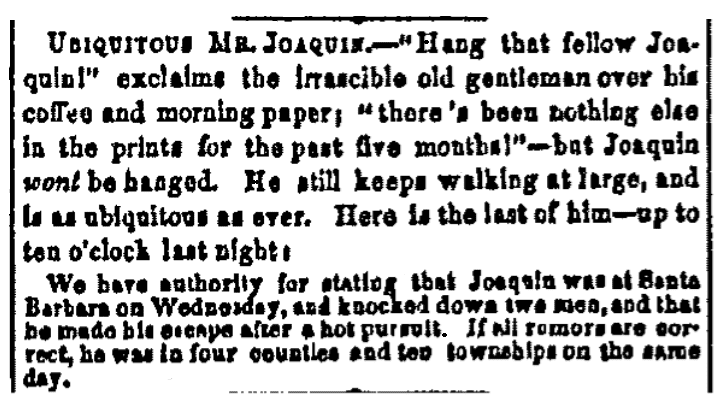
Here is a transcription of this article:
UBIQUITOUS MR. JOAQUIN.
“Hang that fellow Joaquin!” exclaims the irascible old gentleman over his coffee and morning paper; “there’s been nothing else in the prints for the past five months!” – but Joaquin won’t be hanged. He still keeps walking at large, and is as ubiquitous as ever. Here is the last of him – up to ten o’clock last night:
We have authority for stating that Joaquin was at Santa Barbara on Wednesday, and knocked down two men, and that he made his escape after a hot pursuit. If all rumors are correct, he was in four counties and ten townships on the same day.
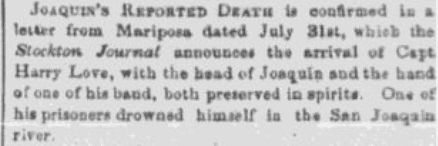
Here is a transcription of this article:
JOAQUIN’S REPORTED DEATH is confirmed in a letter from Mariposa dated July 31st, [in] which the Stockton Journal announces the arrival of Capt. Harry Love, with the head of Joaquin and the hand of one of his band, both preserved in spirits. One of his prisoners drowned himself in the San Joaquin river.
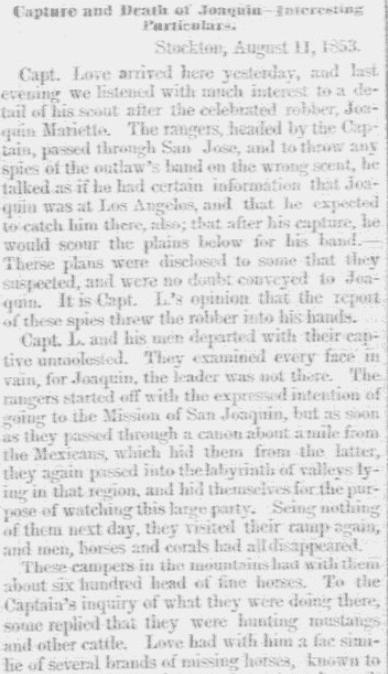
Here is a transcription of this article:
Capture and Death of Joaquin – Interesting Particulars.
Stockton, August 11, 1853.
Capt. Love arrived here yesterday, and last evening we listened with much interest to a detail of his scout after the celebrated robber, Joaquin Murietta. The rangers, headed by the Captain, passed through San Jose, and to throw any spies of the outlaw’s band on the wrong scent, he talked as if he had certain information that Joaquin was at Los Angeles, and that he expected to catch him there, also; that after his capture, he would scour the plains below for his band. These plans were disclosed to some that they suspected, and were no doubt conveyed to Joaquin. It is Capt. L.’s opinion that the report of these spies threw the robber into his hands.
…Making their way secretly through San Jose, and by San Juan, until entirely clear of observation, the rangers struck then, under cover of night, for the Contra Costa range of mountains, and entered their defiles. Here for a number of days, they threaded the numerous passes, now crossing a ridge, and again cautiously traversing its valleys. In many places they found corrals, and bands of horses bearing all description of brands. The third day before the capture of their chief, the rangers came upon a band of Mexicans in the mountains, numbering seventy men, whom they have no doubt was Joaquin’s principal band.
These campers in the mountains had with them about six hundred head of fine horses. To the Captain’s inquiry of what they were doing there, some replied that they were hunting mustangs and other cattle. Love had with him a facsimile of several brands of missing horses, known to have been stolen, and on passing among the stock of this party, he found ten horses bearing the marks in his possession. A portion of them no member of the gang of seventy would own; they said they were strays that had in some manner got in with their caballada; the other portion of the stolen animals they said they had received from Mexicans going to the lower country. It should be remembered that the ranger party thus boldly searching this robber band’s herd only numbered fourteen.
Early in the morning, three days after meeting the large party above mentioned, Capt. L. and his men saddled up to visit an arroyo where there was water, and on approaching it observed smoke, which made them move with caution. They got close upon a sentry guarding a camp before he discovered them, and as he gave the alarm, Joaquin, who was lying down, leaped up, leaving his pistol in his blanket, and ran for his horse, threw a noose over the animal’s nose with a lariat and mounted him bare-backed. The rangers had them surrounded. A parley was held for a few moments, during which Joaquin dictated to two of his men answers to Love’s questions. Capt. Burns, who was familiar with the robber’s countenance, immediately pointed him out and the fight commenced.
Joaquin, while fleeing to avoid the shots aimed at him, would drop, Comanche-like, upon the side of his horse, showing only one limb, and the ball having passed, he would resume his seat with the activity of a cat. He made a dash for a perpendicular bluff some fifteen feet high, which overlooked an arroyo, and leaped his horse down upon its dry bed, thinking that none would follow his dangerous jump. But a young ranger named Henderson followed him, firing his pistol into the robber’s horse as he leaped. The outlaw’s gallant animal had been wounded several times, and after the leap, he made a few ineffectual attempts to run, but at length sank down. Joaquin then fled a few yards on foot; he like his horse had received several wounds, and before he had run thirty yards, two of the rangers who had cut him off from a ravine fired again into his body, when he fell. Holding up his right hand through which a ball had passed, he said “No tiro mas – yo los muerto.” Shoot no more – I am dead.
Note: An online collection of newspapers, such as GenealogyBank’s Historical Newspaper Archives, is not only a great way to learn about the lives of your ancestors – the old newspaper articles also help you understand American history and the times your ancestors lived in, and the news they talked about and read in their local papers.

My name is Don Joaquin Murrita and this is the correct spelling of the name. I’ve read many stories and many interpretations, some with a twist, as he is seen as both a freedom fighter hero to some, and to others he is an outlaw. Whatever people think stays with them. I’ve been researching this era for some times, as do others of our family, seeking things beyond the stories we were told growing up. Since then there have been a lot of misleading claims being made. Speaking about the picture: this is the one most commonly used and said to be Joaquin, but in truth it is a picture of Frank Marshal, son of Ben Marshal, who was a friend of Joaquin’s but they ended up having a falling out. How do I know? Because I’m a direct descendant of Joaquin’s. I also have an established family tree that dates up to the 1700s. There is a lot to Joaquin’s story, and it is hard to separate truth from inaccuracies. All I can do is keep riding his trails in hope we find some great things along the way.
Very interesting, Joaquin. Thanks for writing us; I hope you find out more about your ancestor!